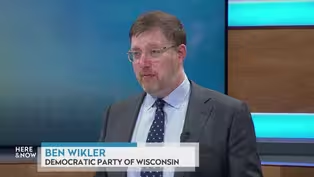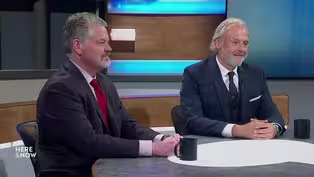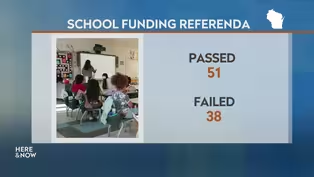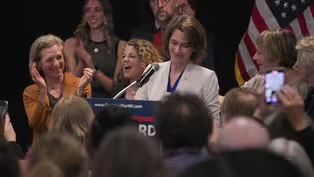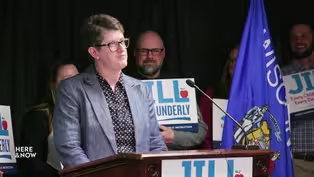Here and Now
Missy Hughes on Trump's Reciprocal Tariffs and Wisconsin
Clip: Season 2300 Episode 2338 | 6m 3sVideo has Closed Captions
Missy Hughes on the Trump administration's reciprocal tariffs and retaliatory tariffs.
Wisconsin Economic Development Corporation Secretary and CEO Missy Hughes considers the Trump administration's reciprocal tariffs and impacts of retaliatory tariffs while on a trade mission in Europe.
Problems playing video? | Closed Captioning Feedback
Problems playing video? | Closed Captioning Feedback
Here and Now is a local public television program presented by PBS Wisconsin
Here and Now
Missy Hughes on Trump's Reciprocal Tariffs and Wisconsin
Clip: Season 2300 Episode 2338 | 6m 3sVideo has Closed Captions
Wisconsin Economic Development Corporation Secretary and CEO Missy Hughes considers the Trump administration's reciprocal tariffs and impacts of retaliatory tariffs while on a trade mission in Europe.
Problems playing video? | Closed Captioning Feedback
How to Watch Here and Now
Here and Now is available to stream on pbs.org and the free PBS App, available on iPhone, Apple TV, Android TV, Android smartphones, Amazon Fire TV, Amazon Fire Tablet, Roku, Samsung Smart TV, and Vizio.
Providing Support for PBS.org
Learn Moreabout PBS online sponsorshipwith razor thin margins.
The Trump tariffs hit this week.
The across the board taxes on imports into the U.S. Are combined with reciprocal tariffs.
Hiking the tax on countries with larger trade imbalances, holding steady with the 25% tariffs on Canada and Mexico on steel and aluminum, and on cars for other countries, the 10% baseline tariffs on all goods imported into the U.S. Will see higher reciprocal rates, like the 20% tariffs on imports from the European Union.
Governor Tony Evers and CEO of the Wisconsin Economic Development Corporation, Missy Hughes, are just now on a trade mission to France and Germany.
Is this good timing or bad?
We turn to Secretary Missy Hughes, who's in France.
And thanks very much for joining us.
From there.
>> Yeah, good afternoon from France.
>> So, Secretary Hughes, what has been the reaction where you are to these U.S. Tariffs?
>> Well, we've really seen generally a lot of disappointment from the French officials and the German officials and the businesses that we've been meeting with.
It's a real surprise over what's happened.
You know, everyone has expressed to me, we have had incredible long term friendships and really a lot of confusion and misunderstanding or, you know, confusion about what's happening and what the future holds.
>> So as to retaliatory tariffs being considered by other countries, what will that mean for U.S. Exports, particularly for Wisconsin?
>> Well, for Wisconsin, we're going to see challenges around, especially our industrial machinery, our large pieces of machines and equipment that we are building and exporting to countries like Germany for use for food processing and the medical industry.
So we're really going to face real challenges for our businesses.
And we have businesses every day that like businesses we've brought here to Germany that are exploring, exporting.
And this is really going to be a challenge for them as they seek new markets.
>> So your trade mission is to promote exports, of course.
And international investments in especially.
I understand, Wisconsin's biohealth sector for its part.
I understand that France is talking about targeting U.S, the U.S. Tech sector.
What do you say to your counterparts in Europe in the face of this?
>> Well, first and foremost, you know, things are changing every day.
So before we even get into conversations about tariffs, we're talking about our long term partnerships.
We're talking about how Wisconsin is here ready to continue these relationships.
But when we're talking about retaliatory tariffs or the tariffs that the U.S. Is putting on these countries, it's really concern about sending the economy into a recession.
And there's a fear that even if the tariffs are alleviated, the chill chilling effect that this is going to have on the economy and the potential recession is really causing concerns for future investment.
>> So we are seeing the stock market sinking.
Certainly consumer confidence is unsteady.
You speak about recession for Wisconsin, for the U.S, for the globe.
>> Yeah.
You know, I mean, if you if you think about the impacts of the tariffs, a company that might be making an investment, a company that might be hiring people is going to stop and say, well, let's wait and see what happens.
And that has a domino effect.
Then really creating a slowdown and really creating a recession.
I have companies that are talking to me concerned about what the future holds.
They have relied on open trade between Mexico and Canada.
They've created supply chains in that way, and now they're really worried about what's going to be the future and this unpredictability and instability is really hard for businesses to plan around.
>> As to the tariffs on Mexico and Canada, what is the current and potential future impact on Wisconsin?
foremost, we're going to see impacts on everyday Wisconsinites pocketbooks.
We're going to see increases in grocery costs.
We're going to see increases in gas and prices.
And that's really going to be having an effect right away.
Longer term we'll see companies really thinking about how do they're jigger their supply chains.
And can they do that because they've relied on buying from Mexico or buying from Canada and even sending parts back and forth across the borders.
And now they're going to have to make decisions about how to continue to make that work, or to move into new or more difficult types of business.
higher prices on just about everything?
>> It's hard to imagine that this isn't going to have an impact through and through and through.
Even a company I was talking to that imports coffee is facing incredible tariffs.
And so we can expect you know, just at the beginning of our day with coffee to have higher costs.
And you know we might see increased costs in health care because we'll see medical devices and perhaps drugs costing more.
So I think everywhere we're going to see real challenges to what we expect and how we pay our bills.
>> What can someone like you in your position do about any of this?
>> Well, first and foremost, we want to provide really good information to our companies.
As you've pointed out, the tariffs are complex.
Whether they're reciprocal or coming into the country.
We want to make sure they have the best information explore ways to mitigate risks or ways to move their supply chain around, we want to be there with the best information to be able to supply them and help them react in the most successful way.
>> Secretary Missy Hughes, >> Secretary Missy Hughes,
Ben Wikler on National Implications of Crawford's Victory
Video has Closed Captions
Clip: S2300 Ep2338 | 5m 41s | Ben Wikler on the 2025 Wisconsin Supreme Court election and impacts on national politics. (5m 41s)
Here & Now opening for April 4, 2025
Video has Closed Captions
Clip: S2300 Ep2338 | 1m 2s | The introduction to the April 4, 2025 episode of Here & Now. (1m 2s)
McCoshen & Ross on the Significance of Wisconsin's 2025 Vote
Video has Closed Captions
Clip: S2300 Ep2338 | 6m 36s | Bill McCoshen and Scot Ross on the outcome of the 2025 Wisconsin Supreme Court election. (6m 36s)
Racine Unified School District Passes 2025 Budget Referendum
Video has Closed Captions
Clip: S2300 Ep2338 | 31s | Voters in the Racine Unified School District passed a $190 million referendum in 2025. (31s)
Recapping the 2025 Wisconsin Supreme Court Election
Video has Closed Captions
Clip: S2300 Ep2338 | 4m 25s | Susan Crawford's win in 2025 secures a liberal majority on the Wisconsin Supreme Court. (4m 25s)
Underly Comments on Her 2025 Superintendent Election Victory
Video has Closed Captions
Clip: S2300 Ep2338 | 1m 55s | Superintendent Jill Underly and Brittany Kinser shared thoughts on education in Wisconsin. (1m 55s)
Providing Support for PBS.org
Learn Moreabout PBS online sponsorship
- News and Public Affairs

Top journalists deliver compelling original analysis of the hour's headlines.

- News and Public Affairs

FRONTLINE is investigative journalism that questions, explains and changes our world.












Support for PBS provided by:
Here and Now is a local public television program presented by PBS Wisconsin
